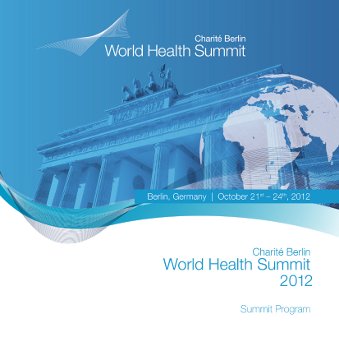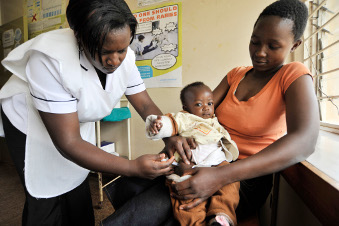NEWSLETTER, NO. 9
Berlin, October 2012
Bringing you these topics:
- Final Program
- Extensive "Further Reading" supply
- Available Ticket Allocation
- Details on our "Information Technology for Health"-Day
- Session Introduction: "Vaccines for Neglected Diseases in Developing Countries"
Final Program Available Online
Sessions, speakers, details, venue plan, FAQ, and much, much more is being summarized in our Final Program. Prior to distributing it on site, you can access it online.
Personal Welcome Messages of Angela Merkel, François Hollande, Zsuzsanna Jakab, Karl Max Einhäupl and Annette Grüters-Kieslich will bid you welcome, before a wealth of information addresses almost all open questions.

Extensive "Further Reading" Supply
Around 50 sessions are waiting for you at the World Health Summit 2012, including workshops, lectures, and symposia on our five main tracks.
In order to help you preparing for the sessions most interesting for you, we provide a wide-spread supply of "further reading" articles and CVs on involved speakers.
Just open the session information in our Online Session Planner to read the pdf articles >>>
Available ticket allocation
Hardly two weeks prior to the World Health Summit 2012, only a small number of tickets is still available.
These tickets enable purchasers to attend all the WHS Sessions, Workshops, Keynote Lectures and some of the Satellite Meetings, not demanding a prior enrollment.
Register today and Share Your Experience with us!

Information Technology for Health
Information technology is an essential component of health today. The vast amount of data which is produced in health-care every day creates huge challenges.
IT for health has a different meaning depending upon which perspective is taken into account: the view of the decision maker in politics is not the same as the view from the CEO's office in the industry.
What is the perspective of science and what of civil society? Only by taking all aspects into account will the picture of IT for health be complete.
(c) Dung Hoang / mhealth revolution, Johns Hopkins Bloomberg School of Public Health, Special Issue 2012
To cover all this promising topics, various sessions are available for you:
IT for Health Research
Workshop
09:00 - 11:00
IT for Health-Care
Workshop
09:00 - 11:00
Health Cloud
Partner Symposium
14:15 - 15:45
Will IT Make the World a Healthier Place?
Panel Discussion
16:00 - 17:30
In addition to this, there will be Keynote Lectures from:
Gerd Binnig
Noble Prize Laureate in Physics in 1986 (Germany)
Christoph Meinel
Hasso Plattner Institute for Software Systems Engineering (HPI), (Germany)
Nikolaus Rajewsky
Max Delbrück Center for Molecular Medicine (Germany)
Volker Wetekam
CEO, General Electric (Germany)
Next to the regular tickets, special single day tickets are available online >>>
Vaccines for Neglected Diseases in Developing Countries
Vaccines are theoretically the best and most cost-effective method to fight infectious diseases. However, when it comes to vaccines for ‘neglected diseases’, there is a huge gap between theory and reality. Diseases are called "neglected" when there is a lack of effective, affordable, or easy to use drug treatments.
The problem is that neglected diseases affect people with extremely low income in developing countries. The market forces don´t help them, unless there are subsidies to bridge the gap between production costs and non cost covering sales prices. To find innovative ways to successfully increase the availability of vaccines to countries through pooling demand and shaping markets is the expertise of GAVI.
Glycomics, the scientific field researching the use of sugars, is another potential game changer. For example, the Max-Planck-Institute of Colloids and Interfaces (MPIKG) alone researches several vaccine candidates for “neglected diseases”.
However, the challenge of bridging the gap between lab-research and marketable vaccines is not answered by scientific innovation.
Entry India, already producing 70 per cent of the world’s vaccines. Why the forces of globalisation may be working in favour of the victims of neglected diseases will be explained in this session.
More information on the program and the various other sessions is available in our Online Session Planner >>>
See you at the World Health Summit 2012!
Contact
Academic Office
Charité – Universitätsmedizin Berlin
Charitéplatz 1
10117 Berlin, Germany
Tel. +49 30 450 572 117
Fax +49 30 450 570 911
secretariat(a)worldhealthsummit.org
Media & Communication
Tobias Gerber, Daniela Levy
Tel. +49 30 450 572 114
communications(a)worldhealthsummit.org
Organizing Office
K.I.T. Group
Association & Conference Management
Kurfürstendamm 71
10709 Berlin
Germany
Tel.: +49 30 246 03 240
Fax: +49 30 246 03 200
secretariat(a)worldhealthsummit.org
Press Accreditation
Tel.: +49 30 97004833
Fax: +49 30 97004834
media(a)worldhealthsummit.org
Do not reply to this email.
If this newsletter is not displayed correctly, please clickhere.


